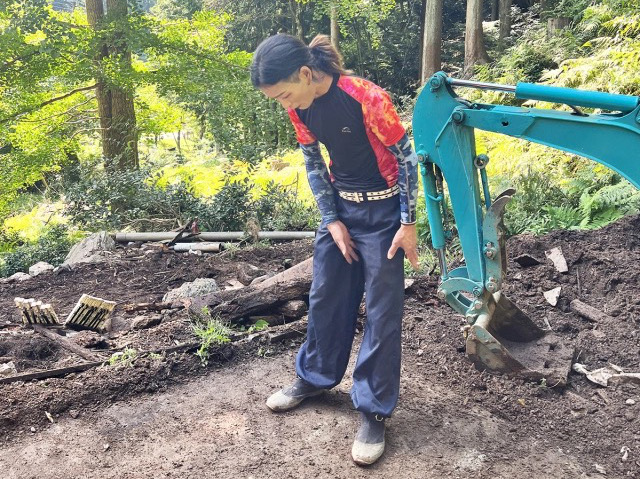
What’s the most appropriate clothing for renovating a property in Japan?
Last year, we became the proud owners of a cheap house in the Japanese countryside, which we purchased for the dirt-cheap price of US$9,100. Ever since then, we’ve been prepping the place for some much-needed renovations with the help of a friendly worker called Imazu from construction firm Hobien, and one thing we noticed about him was how he always seemed so well dressed for the job.
Dressing for the job is a big thing in Japan, even on building sites, where workers seem to have a whole fashion sense of their own. You’ll often see builders up on scaffolding, wearing long trousers that billow out from the knee, and tabi boots with a split that separates the big toe from the rest of the toes.
▼ Imazu (pictured below) also wears billowy trousers, known in the business as “knickerbockers”.
Our boss Yoshio, who usually wears jeans while working at the SoraHouse, was curious to find out what the best outfit would be for renovating a home, so after seeing Imazu in his heavily woven knickerbockers, he asked him:
▼ “Why do you wear those thick trousers?”
Yoshio was expecting Imazu to start listing all the benefits of wearing knickerbockers, but to his absolute surprise, Imazu said:
▼ “These trousers are full of disadvantages.”
According to Imazu, whose main job is landscaping, the trousers tend to get caught in branches, which often hinders his work.
Of course, Imazu did say the trousers benefit workers in other industries, such as construction, where the extra material is said to act like a cat’s whiskers, alerting the wearer to low-level obstacles that might get in their way.
However, in Imazu’s line of work, the best type of trousers for the job are actually thinner, tight-fitting ones, which Imazu often wears while working on the SoraHouse.
Imazu says he bought the knickerbockers when he was starting out and unsure about what to wear, but after years of experience he’s come to realise that they’re not always useful for his line of work. However, seeing as he now owns a pair of knickerbockers and doesn’t want them to go to waste, he still wears them occasionally, for days when he’s out of the bushes and spending most of his time on the digger.
Imazu made his preference for pants clear with this statement:
“Tighter pants with thinner cloth are really the best for me — they don’t get caught on branches, and they’re stretchy so they’re easy to move around in.”
So maybe jeans weren’t a bad choice for working on the SoraHouse after all. But what about footwear?
Imazu says he wears proper work shoes, which protect his feet when working on old buildings like ours. However, he’s not averse to traditional tabi boots, which a lot of workers wear, saying:
“Tabi have thin soles, so it’s easy to get a feel for the ground. In some situations, it can be dangerous if you don’t immediately sense that something’s amiss on the ground, so there are many people who choose to wear tabi.”
The split between the big toe and the rest of the toes on a tabi boot helps to provide extra flexibility and stability, making them particularly useful for workers who climb ladders and work on scaffolding throughout the workday.
After discussing the pros and cons of trousers and footwear, Yoshio and Imazu decided to get back to work, but when they pulled on their work gloves, they realised they actually had one thing in common.
▼ They were both wearing the same brand of gloves!
These gloves were actually recommended to our reporters as a reliable brand by Imazu’s boss, Mr Ogawa, when he came to give us an estimate on demolishing our shed.
The Showa-brand gloves are used by all workers at Hobien, regardless of their specialisation, so they’re good for all kinds of work.
So although our city slickers, who are more suited to sitting at a desk rather than a digger, might look like total newbies when it comes to their workwear, at least they’re one of the gang when it comes to their glovewear.
We’re glad to know we won’t have to invest in heavy knickerbockers and tabi boots to work at the SoraHouse, but we’re now thinking we should at least swap our sneakers for some worker’s boots, for safety’s sake. And for all our sakes, we might get Masanuki to wear something other than a swimming costume next time he visits.
Photos ©SoraNews24
● Want to hear about SoraNews24’s latest articles as soon as they’re published? Follow us on Facebook and Twitter!
[ Read in Japanese ]

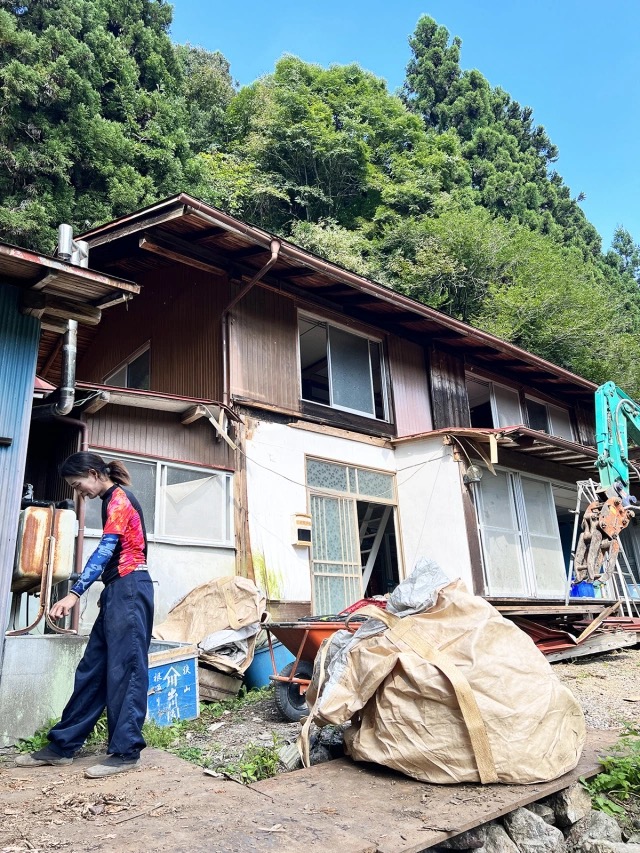
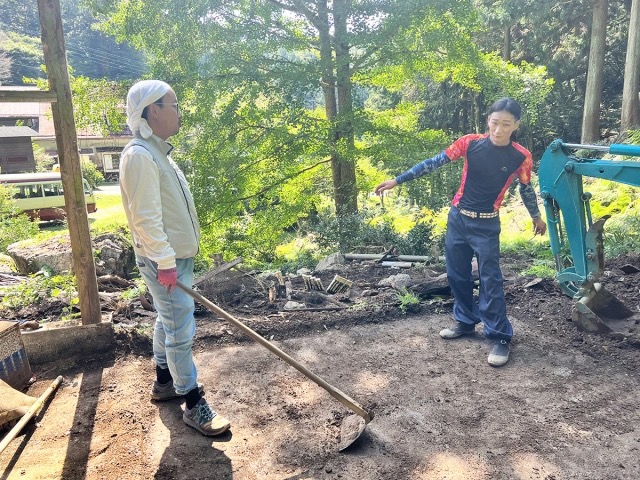

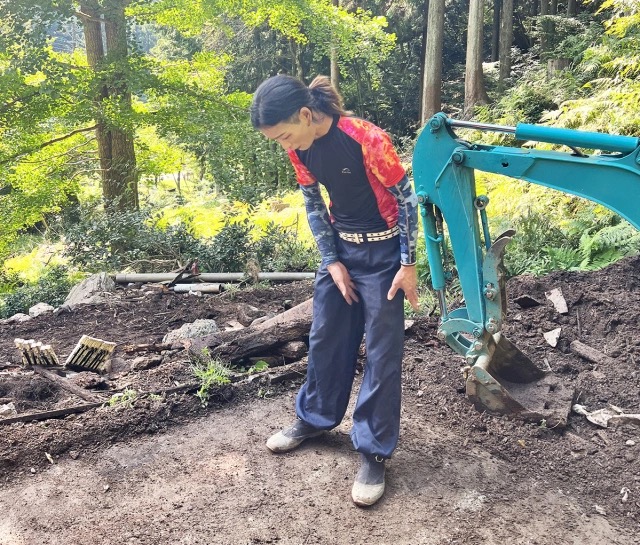
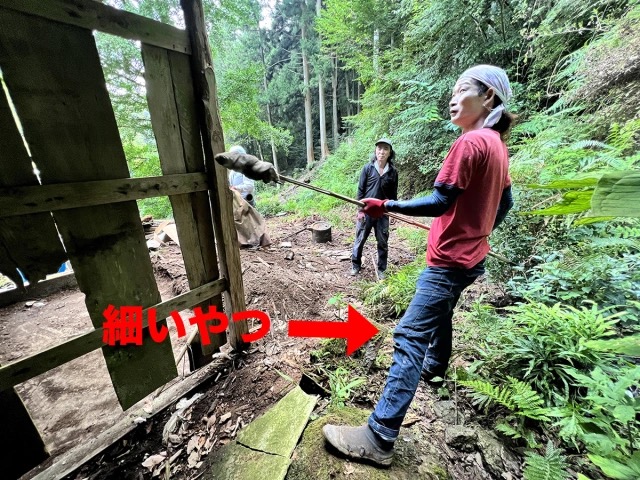
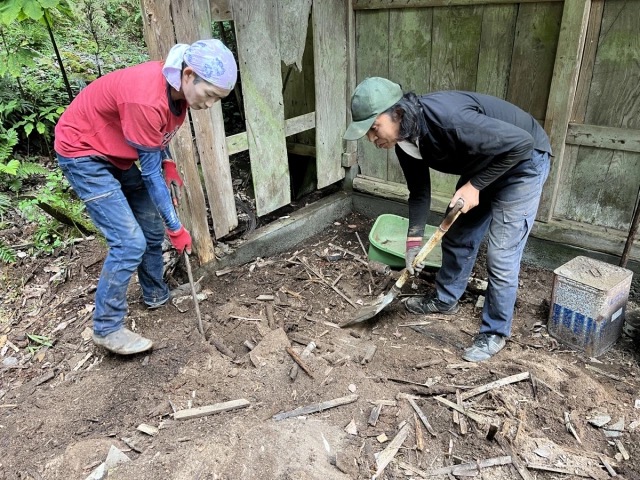
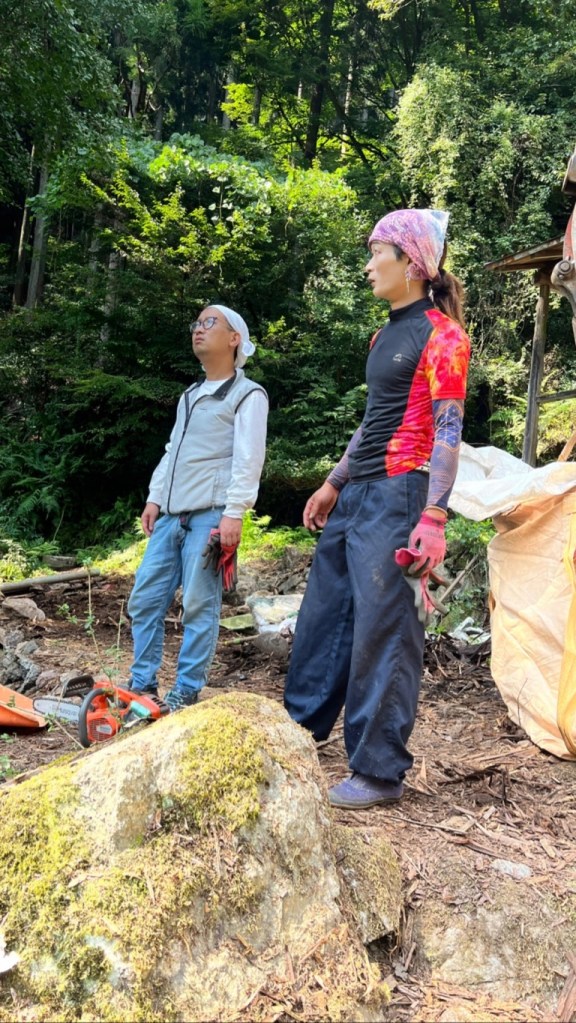
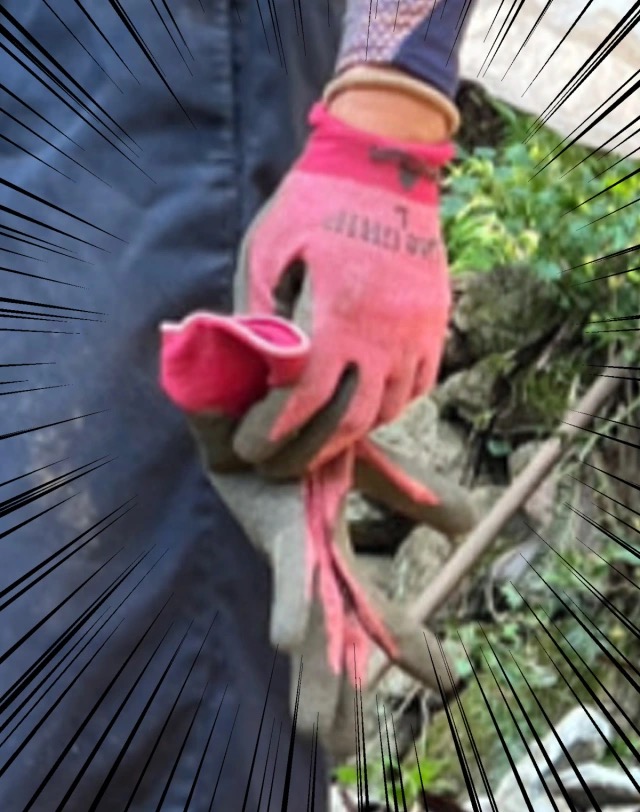
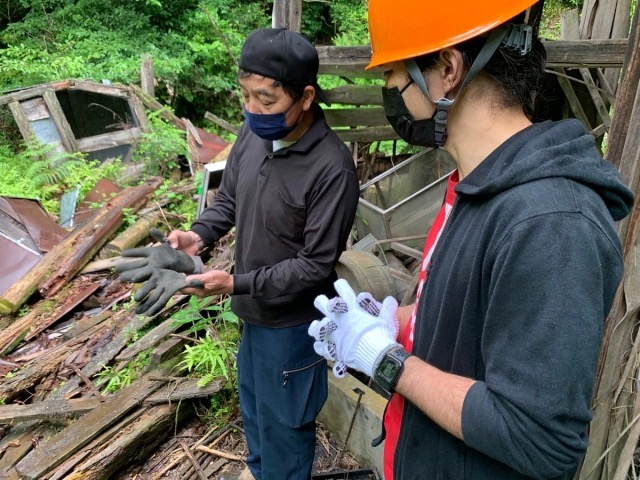
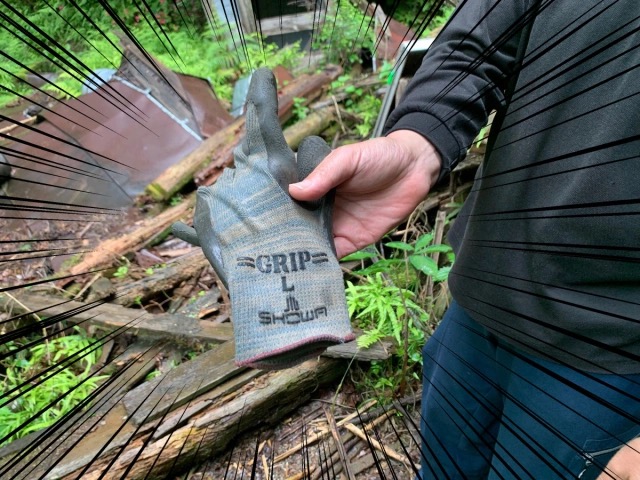
 Turning a crazy cheap country Japanese house into a home — Step 11: Dig for treasure【SoraHouse】
Turning a crazy cheap country Japanese house into a home — Step 11: Dig for treasure【SoraHouse】 Turning a crazy cheap country Japanese house into a home — Step 2: Clearing out weeds【SoraHouse】
Turning a crazy cheap country Japanese house into a home — Step 2: Clearing out weeds【SoraHouse】 Turning a crazy cheap country Japanese house into a home — Step 14: Before and After 【SoraHouse】
Turning a crazy cheap country Japanese house into a home — Step 14: Before and After 【SoraHouse】 Japanese clothing chain offers an answer to job-hunting suit conundrum
Japanese clothing chain offers an answer to job-hunting suit conundrum Dress like your favourite Lupin III character with suits and kimono designed by Japanese tailors
Dress like your favourite Lupin III character with suits and kimono designed by Japanese tailors Red light district sushi restaurant in Tokyo shows us just how wrong we were about it
Red light district sushi restaurant in Tokyo shows us just how wrong we were about it Tokyo Tsukiji fish market site to be redeveloped with 50,000-seat stadium, hotel, shopping center
Tokyo Tsukiji fish market site to be redeveloped with 50,000-seat stadium, hotel, shopping center McDonald’s new Happy Meals offer up cute and practical Sanrio lifestyle goods
McDonald’s new Happy Meals offer up cute and practical Sanrio lifestyle goods Japanese ramen restaurants under pressure from new yen banknotes
Japanese ramen restaurants under pressure from new yen banknotes Historical figures get manga makeovers from artists of Spy x Family, My Hero Academia and more
Historical figures get manga makeovers from artists of Spy x Family, My Hero Academia and more Akihabara pop-up shop sells goods made by Japanese prison inmates
Akihabara pop-up shop sells goods made by Japanese prison inmates Limited-edition Carbonara Udon will anger noodle purists and pasta lovers 【Taste test】
Limited-edition Carbonara Udon will anger noodle purists and pasta lovers 【Taste test】 Sandwiches fit for a sumo served up in Osaka【Taste Test】
Sandwiches fit for a sumo served up in Osaka【Taste Test】 Pokémon Sleep camping suite and guestrooms coming to Tokyo Hyatt along with giant Snorlax burgers
Pokémon Sleep camping suite and guestrooms coming to Tokyo Hyatt along with giant Snorlax burgers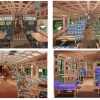 Beautiful Red and Blue Star luxury trains set to be Japan’s new Hokkaido travel stars
Beautiful Red and Blue Star luxury trains set to be Japan’s new Hokkaido travel stars All-you-can-drink Starbucks and amazing views part of Tokyo’s new 170 meter-high sky lounge
All-you-can-drink Starbucks and amazing views part of Tokyo’s new 170 meter-high sky lounge More foreign tourists than ever before in history visited Japan last month
More foreign tourists than ever before in history visited Japan last month French Fries Bread in Tokyo’s Shibuya becomes a hit on social media
French Fries Bread in Tokyo’s Shibuya becomes a hit on social media Studio Ghibli releases new action figures featuring Nausicaä of the Valley of the Wind characters
Studio Ghibli releases new action figures featuring Nausicaä of the Valley of the Wind characters New private rooms on Tokaido Shinkansen change the way we travel from Tokyo to Kyoto
New private rooms on Tokaido Shinkansen change the way we travel from Tokyo to Kyoto Starbucks reopens at Shibuya Scramble Crossing with new look and design concept
Starbucks reopens at Shibuya Scramble Crossing with new look and design concept Studio Ghibli glasses cases let anime characters keep an eye on your spectacles
Studio Ghibli glasses cases let anime characters keep an eye on your spectacles Beautiful Ghibli sealing wax kits let you create accessories and elegant letter decorations【Pics】
Beautiful Ghibli sealing wax kits let you create accessories and elegant letter decorations【Pics】 Studio Ghibli releases Kiki’s Delivery Service chocolate cake pouches in Japan
Studio Ghibli releases Kiki’s Delivery Service chocolate cake pouches in Japan New definition of “Japanese whiskey” goes into effect to prevent fakes from fooling overseas buyers
New definition of “Japanese whiskey” goes into effect to prevent fakes from fooling overseas buyers Our Japanese reporter visits Costco in the U.S., finds super American and very Japanese things
Our Japanese reporter visits Costco in the U.S., finds super American and very Japanese things Studio Ghibli unveils Mother’s Day gift set that captures the love in My Neighbour Totoro
Studio Ghibli unveils Mother’s Day gift set that captures the love in My Neighbour Totoro New Japanese KitKat flavour stars Sanrio characters, including Hello Kitty
New Japanese KitKat flavour stars Sanrio characters, including Hello Kitty New Pokémon cakes let you eat your way through Pikachu and all the Eevee evolutions
New Pokémon cakes let you eat your way through Pikachu and all the Eevee evolutions Disney princesses get official manga makeovers for Manga Princess Cafe opening in Tokyo
Disney princesses get official manga makeovers for Manga Princess Cafe opening in Tokyo Sales of Japan’s most convenient train ticket/shopping payment cards suspended indefinitely
Sales of Japan’s most convenient train ticket/shopping payment cards suspended indefinitely Sold-out Studio Ghibli desktop humidifiers are back so Totoro can help you through the dry season
Sold-out Studio Ghibli desktop humidifiers are back so Totoro can help you through the dry season Japanese government to make first change to romanization spelling rules since the 1950s
Japanese government to make first change to romanization spelling rules since the 1950s Ghibli founders Toshio Suzuki and Hayao Miyazaki contribute to Japanese whisky Totoro label design
Ghibli founders Toshio Suzuki and Hayao Miyazaki contribute to Japanese whisky Totoro label design Doraemon found buried at sea as scene from 1993 anime becomes real life【Photos】
Doraemon found buried at sea as scene from 1993 anime becomes real life【Photos】 Tokyo’s most famous Starbucks is closed
Tokyo’s most famous Starbucks is closed One Piece characters’ nationalities revealed, but fans have mixed opinions
One Piece characters’ nationalities revealed, but fans have mixed opinions We asked a Uniqlo employee what four things we should buy and their suggestions didn’t disappoint
We asked a Uniqlo employee what four things we should buy and their suggestions didn’t disappoint Princesses, fruits, and blacksmiths: Study reveals the 30 most unusual family names in Japan
Princesses, fruits, and blacksmiths: Study reveals the 30 most unusual family names in Japan Tearing down the ceiling at our cheap Japanese house in the countryside【SoraHouse】
Tearing down the ceiling at our cheap Japanese house in the countryside【SoraHouse】 Behind the counter: what it’s like to work as All Nippon Airways ground staff【Video】
Behind the counter: what it’s like to work as All Nippon Airways ground staff【Video】 Renovations at our cheap Japanese house in the countryside plummet to new lows
Renovations at our cheap Japanese house in the countryside plummet to new lows We accidentally turned our cheap country house into a “gaming house” for Christmas【SoraHouse】
We accidentally turned our cheap country house into a “gaming house” for Christmas【SoraHouse】 Pikachu pyjamas make this secret Pokémon fukubukuro lucky bag worth searching for
Pikachu pyjamas make this secret Pokémon fukubukuro lucky bag worth searching for For just 5 yen, Amazon Japan’s cheapest possible outfit will have you looking like 0.04 bucks!
For just 5 yen, Amazon Japan’s cheapest possible outfit will have you looking like 0.04 bucks! Traditional tabi socks let you sneak around like a modern ninja while providing maximum comfort
Traditional tabi socks let you sneak around like a modern ninja while providing maximum comfort Stretching the limits of Japanese budget belts with the Easy Stretch Belt from the 100 yen store
Stretching the limits of Japanese budget belts with the Easy Stretch Belt from the 100 yen store 44 bubble machines on the roof of a Japanese country house is our idea of renovating【Video】
44 bubble machines on the roof of a Japanese country house is our idea of renovating【Video】 Japan’s new Pajama Suit is the perfect all-day, all-situations outfit for our current lifestyle
Japan’s new Pajama Suit is the perfect all-day, all-situations outfit for our current lifestyle Sleeve cats are taking over the internet in Japan this winter
Sleeve cats are taking over the internet in Japan this winter A Chinese bank regulator died from working overtime — And officials applauded his dedication
A Chinese bank regulator died from working overtime — And officials applauded his dedication Abandoned Japanese houses transformed into stunning modern homes
Abandoned Japanese houses transformed into stunning modern homes We test out the “chairless magic chair” that allows you to sit whenever, wherever you want
We test out the “chairless magic chair” that allows you to sit whenever, wherever you want We try it out: Does Uniqlo’s HeatTech Ultra Warm work on a motorbike ride in the dead of winter?
We try it out: Does Uniqlo’s HeatTech Ultra Warm work on a motorbike ride in the dead of winter? What happens when you wear a smile mask on a Japanese train?
What happens when you wear a smile mask on a Japanese train?
Leave a Reply